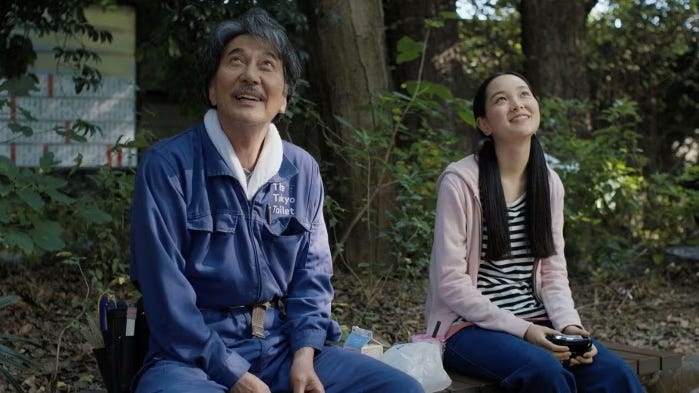Perfect Days is a film by German director Wim Wenders where we follow a man called Hirayama (played by Koji Yakusho) as he cleans toilets at the Tokyo Toilet Project. These public toilets were designed by famous architects like Tadao Ando & Kengo Kuma. The project was meant to be ready for the 2020 Summer Olympics, but the pandemic dashed those plans, so Koji Yanai, who led it, reached out to film directors he admired, to raise international awareness of the effort. According to the NYT, Wenders, a longtime admirer of Japan, agreed to make a feature film.
This movie was Japan’s entry to the 2024 Oscars in the international film category & was one of the five short-listed nominees for Best International Film. Koji Yakusho won the Best Actor Award at Cannes last summer.
The movie unfolds at a gentle pace, depicting each day from morning to night as Hirayama wakes up, brushes, tends to his bonsai collection, drives to work, & starts scrubbing toilets. He takes pleasure in the methodical regularity of his work, just as he enjoys his daily lunch break in the same outdoor spot — where he photographs the same trees and smiles at the same strangers — & his daily post-work meal at the same busy commuter bar. When one day is complete, Wenders takes us through the schedule all over again; weekends, with bicycle trips to the laundromat, the bookshop & a hole-in-the-wall restaurant run by a cheerful Mama-san, are different but just as contentedly regimented. Rinse, Repeat.
The variations come in Hirayama’s leisure time: the books he reads (Patricia Highsmith one day, William Faulkner another) & the music that he listens to from his collection of classic rock & soul — Patti Smith, Otis Redding, Van Morrison, Nina Simone — all on cassettes. It is a stubbornly analog existence, to the amusement of his peers. But when Niko (Arisa Nakano), the teenage daughter of his estranged sister, turns up unannounced at his doorstep & decides to stay a few days, the ensuing disruptions to his routine also expose that the monotonous routine is perhaps a defense against a past life he has turned his back on.
We hear The Animals’ House of the Rising Sun in the film twice — this old song laments a life ruined by time spent in a house of ill repute. And yet, I didn’t see the movie as a lament. Constantly showing us daybreak over Tokyo, the movie reminds us to pay attention, to appreciate the transient beauty around us, to live in the moment, take each day as it comes & to be content playing our part.
Next time is next time. Now is now.1
This may not make our days perfect, but it will make life better.
Time did a nice movie review that captured its essence:
The idea, maybe, is that in seeking a comfortable closure — to a song, to a movie, to a random day — we’re looking for the wrong thing. That’s what Perfect Days, its title borrowed from one of Lou Reed’s most beautiful songs, is about. We seek meaning in everyday life, not realizing that life every day is the meaning.
Each moment is your life, and the only way to waste it is by wondering if you’re wasting it.
It’s not a perfect movie — the first half is very slow — but it comes close. Try to see it. You may also come to appreciate the dance of the daffodils.2
Rituals
The movie serves a reminder to reflect on rituals — I mean, secular rituals in our day-to-day life. What would Wenders shoot if your life was being filmed?
How we change — yet remain constant — from moment to moment, year to year, from one life stage to the next is a subject Robert Fulghum explores in his classic work, From Beginning to End — on rituals & their importance to our lives.
Everyone lives a ritualized life. Rituals are repeated patterns of meaningful acts. If you're mindful of your actions, you'll see the ritual patterns. If you see the patterns, you may understand them. If you understand them, you may enrich them. In this way, the habits of a lifetime become sacred.
Is that so?
Chosen
Joy does not arrive with fanfare
on a red carpet strewn
with the flowers of a perfect life
joy sneaks in
as you pour a cup of coffee
watching the sunlight
hit your favourite tree, just right
and you usher joy away
because you are not ready for her
your house is not as it should be
for such a distinguished guest
but joy cares nothing for your messy home
or your bank-balance, or your waistline, you see
joy is supposed to slither through
the cracks of your imperfect life
that’s how joy works
you cannot truly invite her
you can only be ready when she appears
and hug her with meaning
because in this very moment
joy chose you.
Donna Ashworth
May joy choose you; be ready, dear reader.
Or Whatever Will Be, Will Be (Que Sera, Sera)
As schoolkids we had to memorize Wordsworth’s I Wandered Lonely As A Cloud. Hirayama helps us understand what Wordsworh meant by enjoying this bliss in solitude.
Poetry is the spontaneous overflow of powerful feelings: it takes its origin from emotion recollected in tranquility.
William Wordsworth, Lyrical Ballads



A Japanophile like me must watch the movie. I loved the “joy” poem. And I must tell you…I was in a slight agitated mood since this morning but reading this made me a lot quieter and possibly even a bit “joyful “. Yes, I can’t afford to miss this sneaky guest.